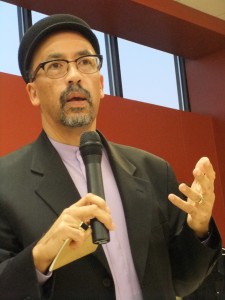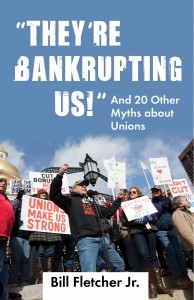
By ED FINKELSTEIN
Publisher
If anyone in Organized Labor thinks we can try to talk and/or reason with the Republican Party, which has now been taken over by the radical right, or reach some kind of an accommodation with them, they are “living in an illusion.” That’s because “they are not taking prisoners…they simply want to annihilate Organized Labor.”
With those frank comments, author and labor activist Bill Fletcher Jr., launched into a startling presentation as to the need, the desperate need, for Organized Labor to rebuild itself “or we’ll be history.”
In St. Louis last month to talk about his new book, They’re Bankrupting Us! And 20 Other Myths About Unions, Fletcher took a bolder, broader approach to the survival of the labor movement, which he characterized as “absolutely essential because there is no democracy without a real labor union, an independent democratic movement. A lot of people don’t get that. We have to reintroduce that discussion.”
LITTLE KNOWN ABOUT UNIONS
 Fletcher began his presentation with making it clear that the general public really knows little about unions today.
Fletcher began his presentation with making it clear that the general public really knows little about unions today.
This is the result of:
• A wholesale assault on labor that has been underway for years, funded by billionaire reactionary Republicans who see labor unions as “an obstacle to their economic agenda.”
• An unrelenting assault on unions in the media, both directly through the massive control of radio talk shows by the radical conservative right, Fox News and subliminally through TV shows.
He gave an example of two Law and Order SVU episodes in which it appeared that a teachers union was trying to protect a murderer and construction unions were featherbedding the remodeling of a police station.
• The passiveness of our unions to challenge anything in the media that’s negative about unions. “You can bet if there was something positive about unions, the Koch brothers and their ilk would be flooding the network and program producer with complaints.”
• The “holding ground” mentality of the labor movement since the ’40s that we were secure in our position, not appreciating that the other side “is relentless. They have no intention of stopping.”
DIFFERENT THINKING
To save the labor movement for the sake of America, labor leadership is going to have to start thinking in a different way. The glory days when 35 percent of the workforce was organized are gone, Fletcher emphasized.
Labor’s strengths, he said, have to be found in its people, new creative approaches, new tactics, mobilization and disruption.
“We can’t continue to fight like we did in the 60’s and ‘70’s. It’s a different world. We have to use these assets in a different way; guerrilla warfare.”
NEW MODEL FOR LABOR
The model we need to use is the same as used in the business world: turnaround management, Fletcher said. This new concept includes:
• New leadership. Yesterday’s leaders are not prepared to fight today’s war, and it is a war with the right-wing, he emphasized.
• An appreciation of young people. Too often today we hear in our unions, “That’s not the way we do it here” or “you haven’t paid your dues yet,” which “guarantees to cleanse the organization of young people.” Our young members want to do it in a very different way with communications and activism.
Every generation brings new tactics, different ways to solve problems he pointed out, noting that the sit in strikes of the ‘30s were adapted by the civil rights movement in a different, but still effective, way.
• Need to take risks. “If you are simply worried about survival, you act one way. But when you think it’s over, you begin to act differently. It’s not about preserving that pension plan or the nice headquarters, we are at war…. we have nothing to lose by rolling the dice, taking real risks.”
• Mission clarification and internal education. What are our unions trying to accomplish, what’s our new mission? Once we have that clearly spelled out, then the entire organization can get behind it. We have to do an incredible internal educational effort to understand who the enemy is and who it’s not.
Fletcher said that unions today are passive about member education, and that has to change. “The members are not stupid.” They are interested in being asked their opinions and not being told but being part of the discussion.”
• Organization assessment and restructuring. In the 70’s what we are doing today was cutting edge then. We need to rethink how the organization functions now, and not (continue) worshiping the past.
• Keep moving forward. Today, it’s not about remaining where you are, but rather moving forward. We have to finally recognize “the other side is not interested in peace in our time… the other side is interested in us disappearing.”
RAW MATERIALS IN PLACE
“We have all the raw material,” Fletcher stressed: “Great activists, some good leaders, but we need to push the leaders of our unions into action.
“We have to operate differently. We have to shake things up. It can be done, but we don’t have a lot of time.”
RTW IS CURARE
He noted that “the other side saw a strategy in linking the anti-worker right-to-work with racism” and that helped them spread it throughout the west and south.
Since then, RTW has been like the poison curare that numbs you when it gets to your brain. As a result, our movement “sat back and assumed that things were never really that bad” and today we have RTW in Michigan and Indiana, Fletcher said.
We had better wake up NOW, Fletcher stressed, because “the situation is grave. It’s almost over; the other side sees this as the time to end it all.”
We can’t let “millions of workers be crushed by their juggernaut. We have to think differently, really differently” to survive.
“We can’t match their money, so we resist – we have the right to resist – through “guerrilla warfare, fighting in a different way.”
“I hope my book will be a contribution to the discussion, to (help) get more people involved. “
Fletcher is executive assistant to the national vice president of Women’s and Fair Practices Departments of the American Federation of Government Employees, AFL-CIO.
The program was sponsored by The Justice Institute of St. Louis, whose mission is to build a network of leaders, teachers and students to motivate and empower grassroots activists through political education and training to ensure economic, political and social justice for working people.
The program was held at the Painters and Allied Trades District Council 2 hall.

